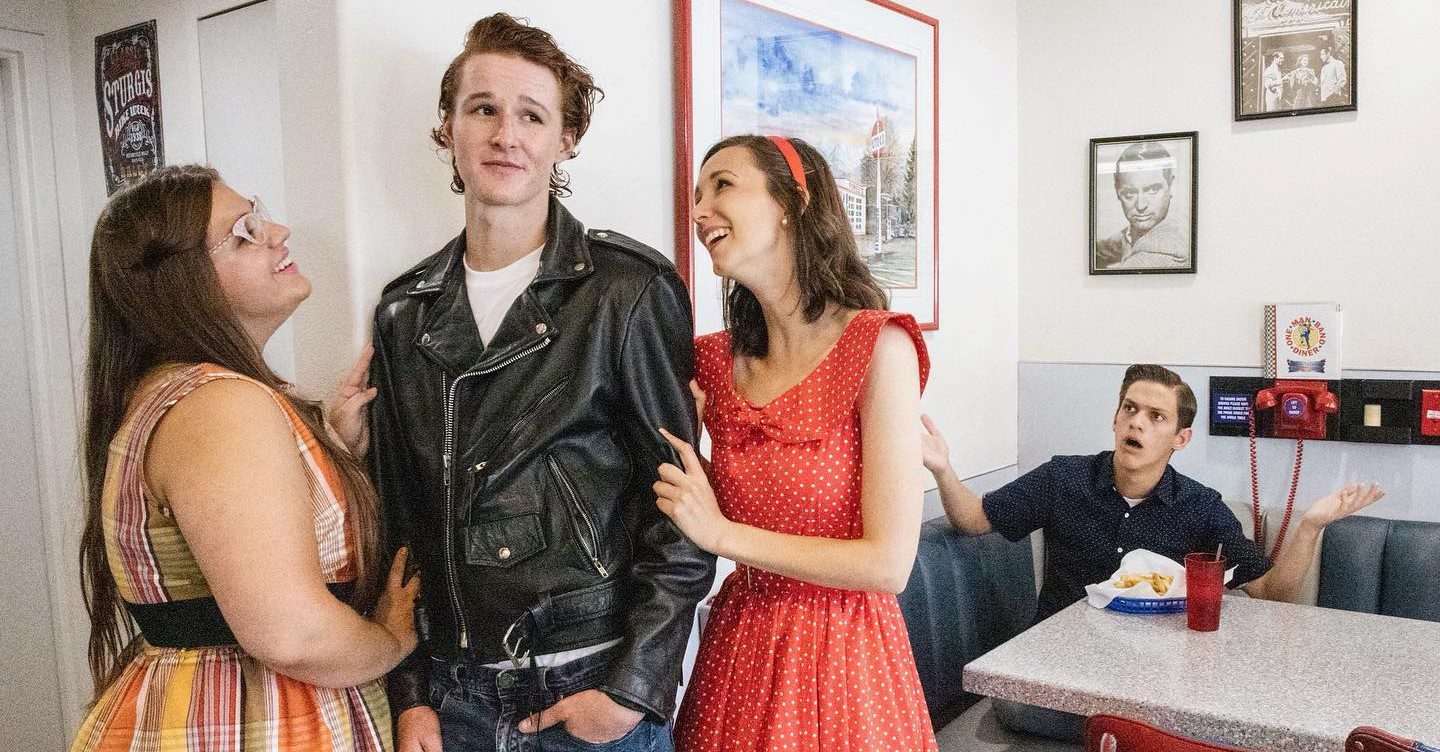LEHI — On the surface, Bye Bye Birdie is a story of heartbroken teenyboppers in 1960 who mourn when their rock idol is drafted into the army. The show is very much a product of its time, and script references to Dolores del Rio, Postum, and Peter Lawford have not aged well. But, beneath the midcentury cultural references, there is an enduring show about intergenerational friction and teenagers’ struggle for independence. Kim MacAfee would be in her mid-70s today, but her desire to forge her own path in life is something her grandchildren could relate to.

Bye Bye Birdie (with a script by Michael Stewart, music by Charles Strouse, and lyrics by Lee Adams) tells the story of rock singer Conrad Birdie who is drafted into the army. His business manager and songwriter, Albert Peterson, writes a sendoff song, “One Last Kiss.” The song will debut when Conrad sings it to a randomly chosen fan, Kim MacAfee of Sweet Apple, Ohio. The song culminates in a kiss on national television, but this sends her boyfriend, Hugo Peabody, into a jealous rage. Meanwhile, Albert is torn between his girlfriend/secretary of eight years, Rose Alvarez, and his domineering mother. The two women can’t stand one another, and Albert cannot make one happy without alienating the other.
Dani LeCompte directed this production, which bubbles with fun and humor. LeCompte puts the action on stage well, and some of her unique touches, such as a broom for Albert to dance with during “Talk to Me,” add dimension and theatricality to the scenes. The show is paced well, and its two and a half hours (including a 15-minute intermission) breeze by. LeCompte has a talent for managing scenes with large numbers of people, and I loved how “Healthy Normal American Boy” could effortlessly shift focus from a reporter questioning Conrad to the entire stage singing his praises and back again.

I was confused, though, with LeCompte’s decision to include Joshua Griffiths an on-stage “Conrad Guitar Man.” Griffiths plays an electric guitar during “Honestly Sincere” and “One Last Kiss,” but it adds little to the songs. For these songs (and during “Healthy Normal American Boy”) he awkwardly trails Conrad like a puppy dog, and other actors on stage dance around without acknowledging him.
LeCompte also served as a choreographer, and the dancing is a treat. “A Lot of Livin’ To Do” is smooth and lively, but spiced up with some period dance steps. “Put on a Happy Face” sets the youthful tone for the rest of the play, and “Spanish Rose” is an example of how a dance can reinforce a character’s emotional expression.

As Rose Alvarez, Ami Abram Blakesley takes charge of every scene she is in. Her commanding presence makes her a worthy adversary for Albert’s mother, Mae Peterson. Blakesley also slides nicely from speech to song, and her skills in dancing make her a triple threat on stage.
Nathaniel Brown played Albert Peterson as a serious businessman who is also trying to keep the peace between the two women he loves. Brown is excellent at showing Albert as a man under his mother’s thumb. When he does break free, it is a satisfying scene, thanks to the self-assurance that Brown gives Albert in that moment.
Luke Elison played Hugo Peabody as a young man who feel helpless as the fame machine of Conrad Birdie moves in on his relationship. While Bye Bye Birdie is a big-cast musical on a large stage, Elison can add subtlety to his performance, such as the glares at Conrad during the “A Lot of Livin’ To Do” dance. As the target of Hugo’s affection, Diane Tuft is a lovely presence in the show. Her graceful dancing and gentle demeanor made it easy to see why Hugo would fight for her affection.

One disappointment in the cast, though, was Thompson Scribner as Conrad Birdie. Scribner’s singing performances were unenergetic, and his dialogue was often wooden. It was strange to watch him sing and dance stoically during “Honestly Sincere,” “One Last Kiss,” and “A Lot of Livin’ To Do” while the other actors bounding with excitement to see him.
Denise Gull designed costumes for this production, and her best work is in the women’s costumes. Every female, from the leads to the lowliest ensemble member, was dressed perfectly for the time period. The men’s costumes, though, were less consistent. The teenage boys had period shirts, but the men were often given generic suits that did not necessarily match the era. Albert’s main suit jacket, for example, looked like it belonged to 1990, not 1960. The worst offender, though was Conrad’s blue suit for the end of Act I, which looked like it belonged on a 1970s disco floor.
Bye Bye Birdie is a good example of how important it is to match a show to a company. Arts council productions often have multiple family members performing with one another and a disproportionate number of teenagers in their casts. A play that deals with intergenerational tension while also giving younger cast members a lot of fun scenes to perform is a double-win for Lehi Arts Council. Yes, the production has some shortcomings, but no more than the typical amateur production. None of these flaws are fatal, though, and it was nice to sit in the theater and enjoy a classic show that has heart and an uplifting message.
[box]The Lehi Arts Council production of Bye Bye Birdie plays nightly (except Sundays) at 7 PM through August 7 at Willowcreek Junior High School (2275 West 300 North, Lehi). Tickets are $8-12. For more information, visit lehicityarts.org.[/box]
